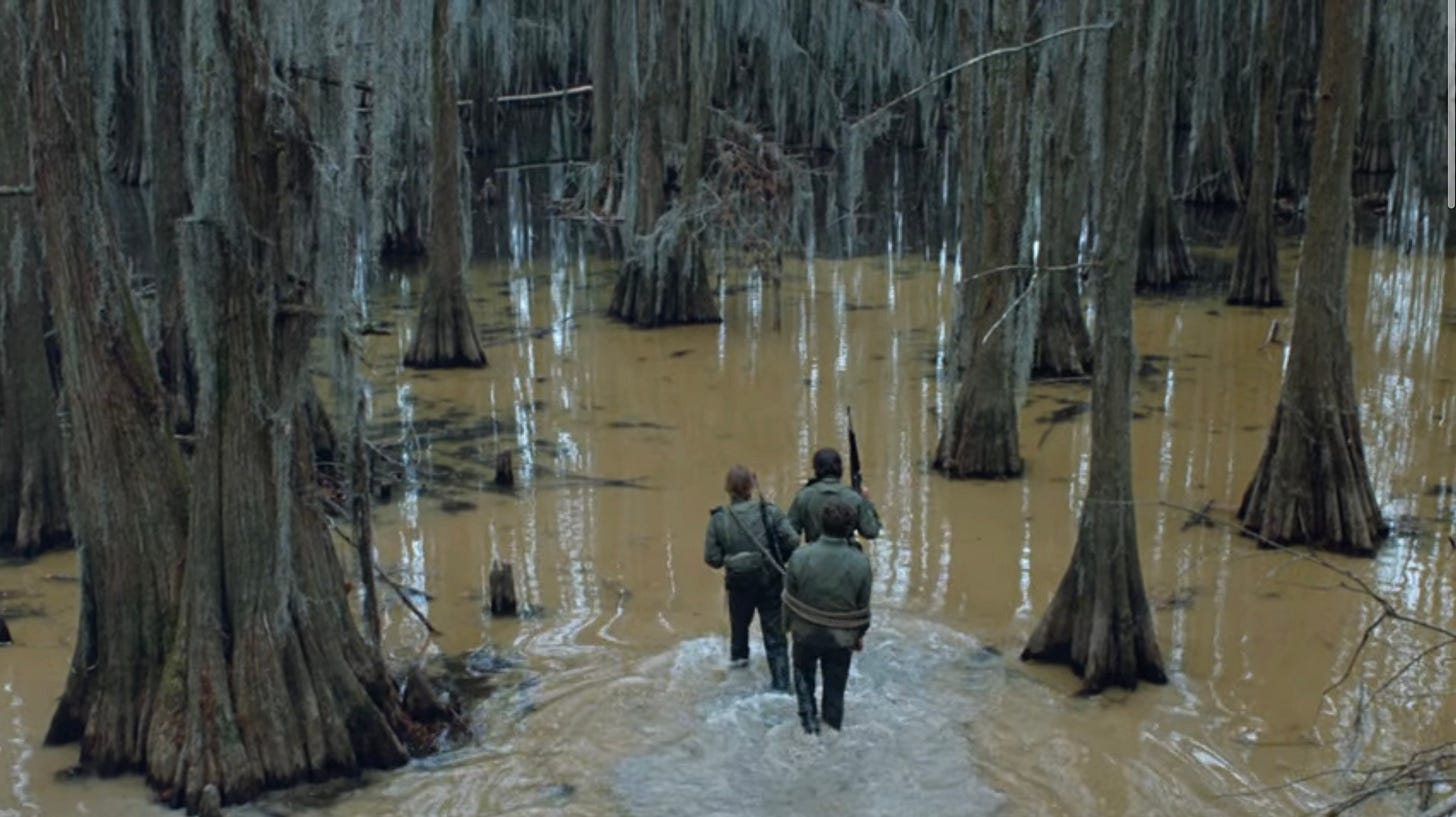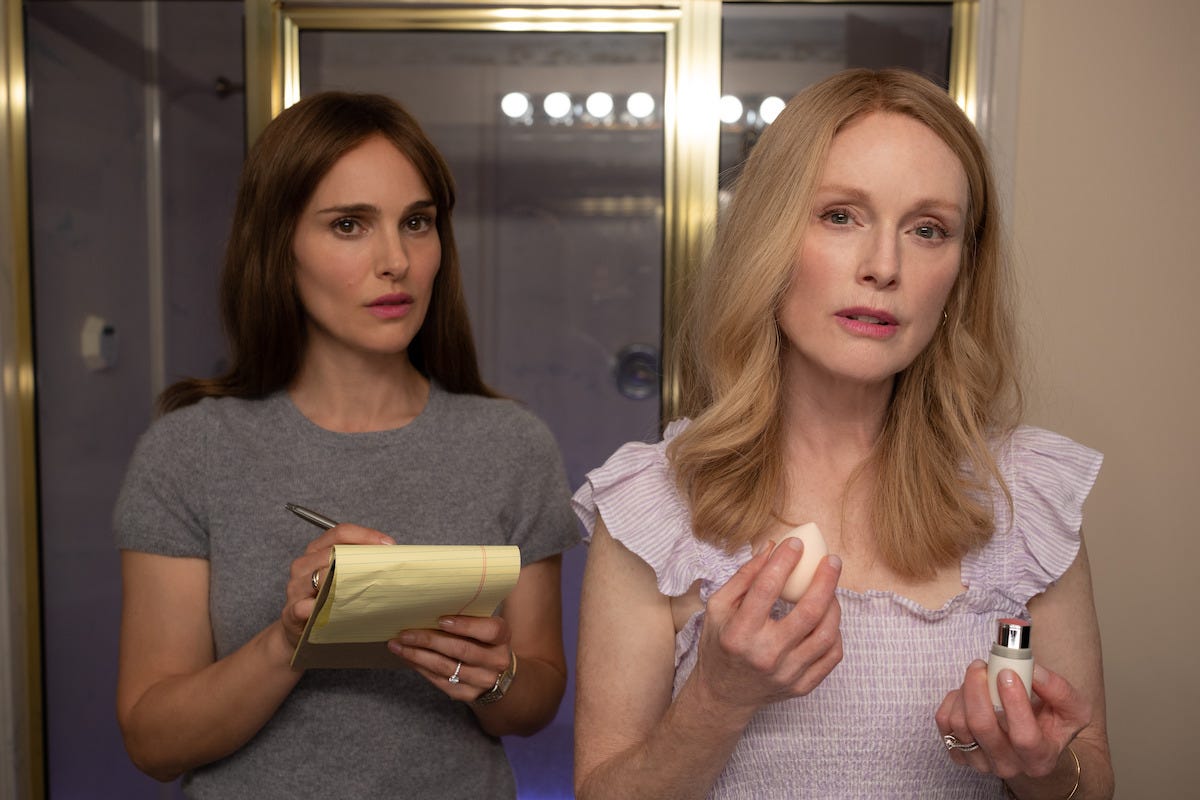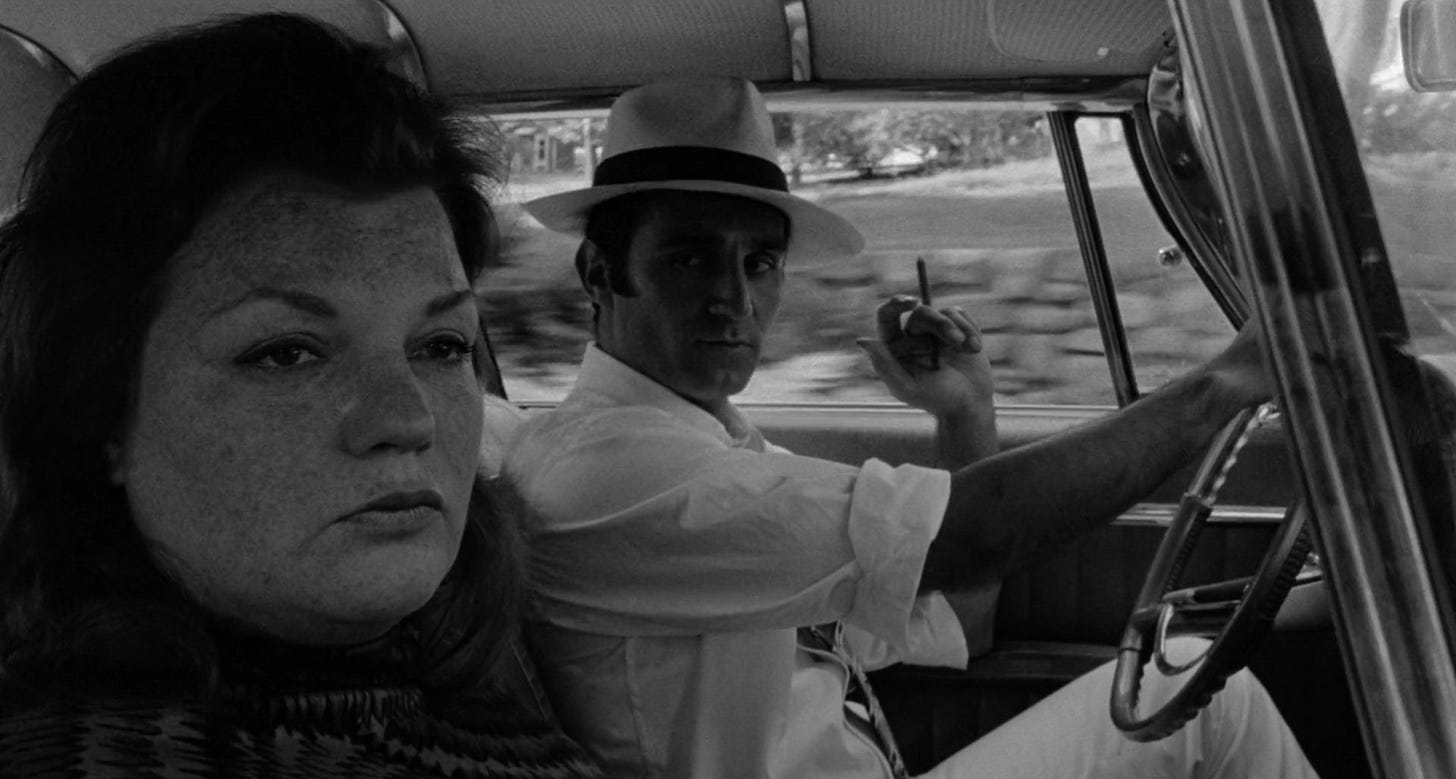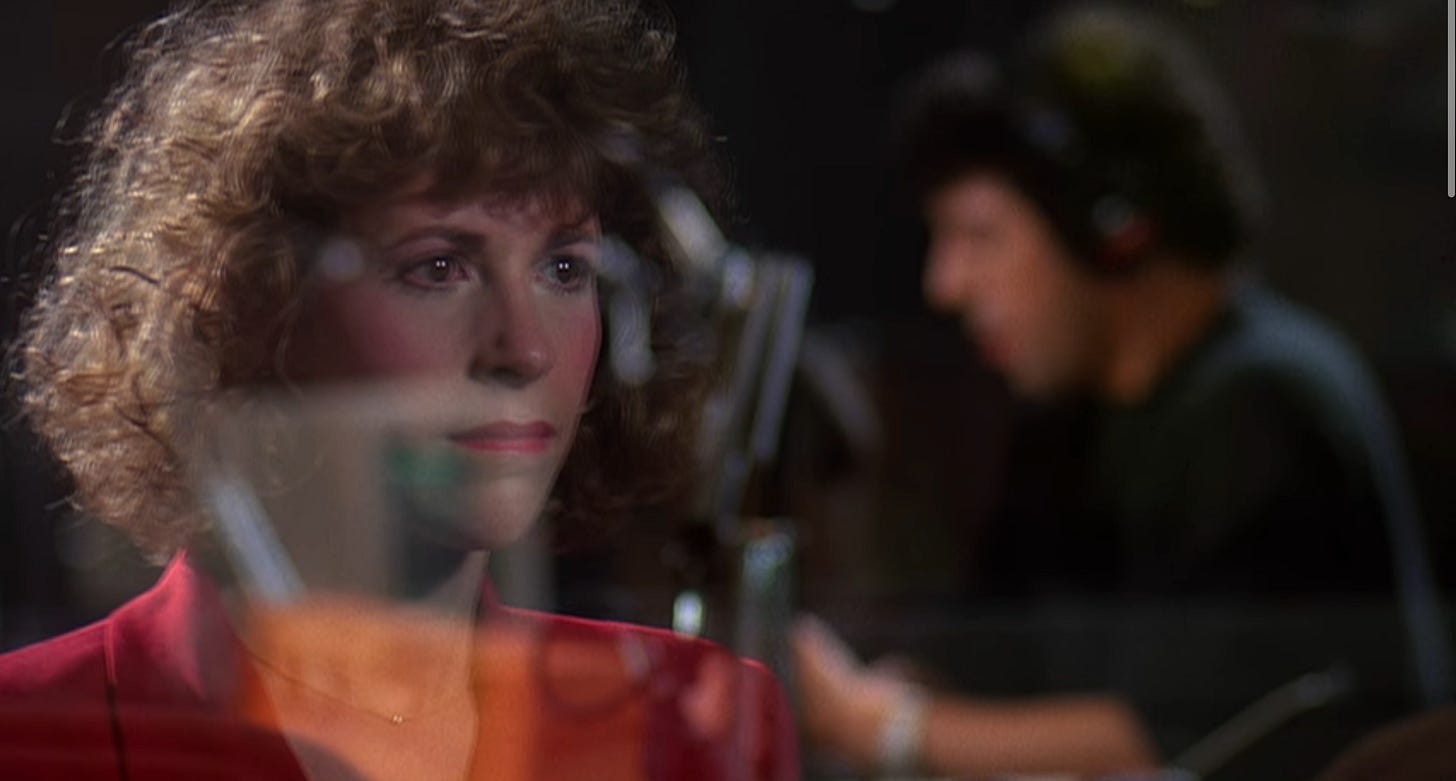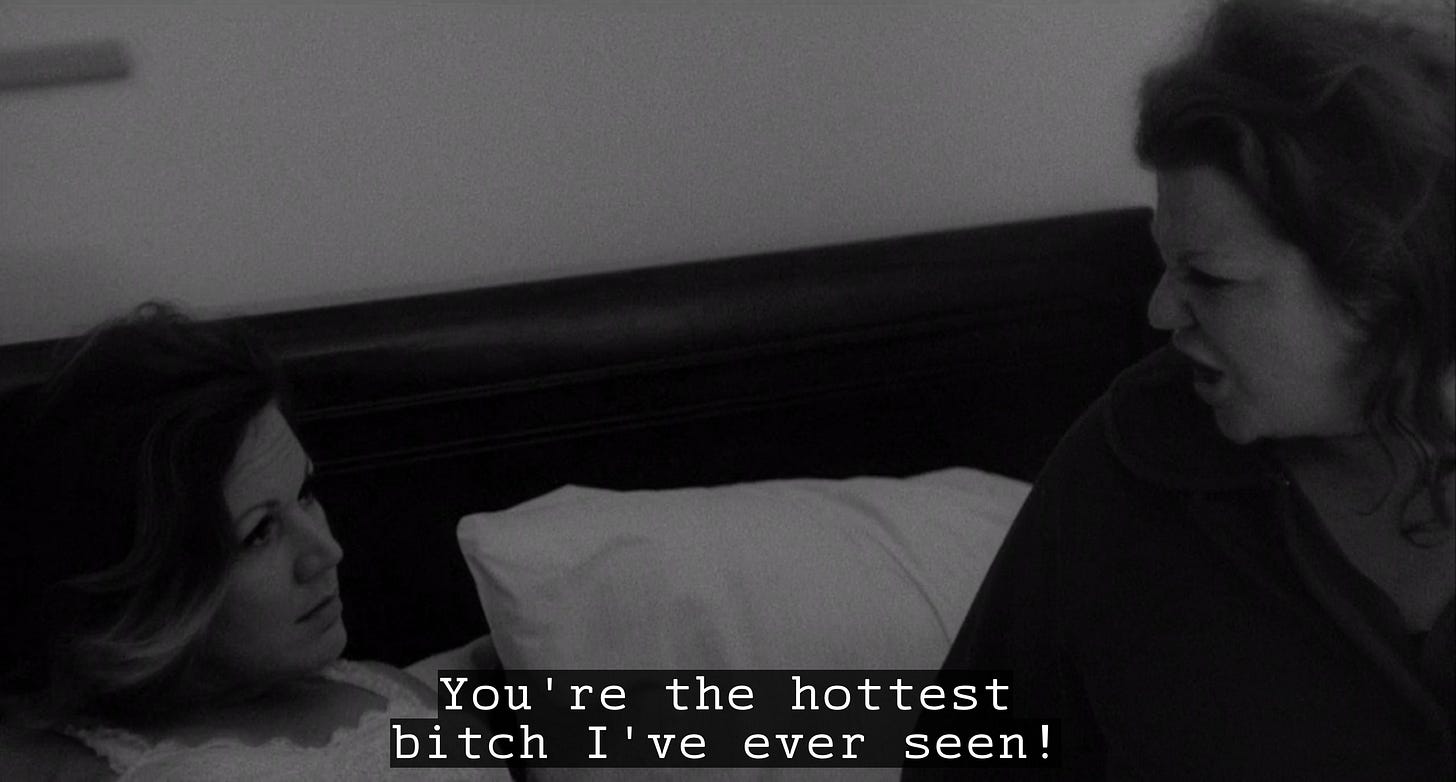Favorite First Watches of November
Call it American Sin-ema the way these standout films interrogate our homegrown evils
Southern Comfort (1981)
Director: Walter Hill
Genre filmmaker Walter Hill (The Driver (1978), The Warriors (1979), Streets of Fire (1984) has developed a cult reputation over the years, thanks to his incisive action and Western films, which richly interrogate codes and motifs of ultraviolence. I had never heard of this film in particular, until I found myself on a bit of a Powers Boothe-kick after plowing through Deadwood. What a picture! A razor-sharp allegory for the power disparity (and senselessness) of the Vietnam War, the film supposes a simulation in which Americans are dropped into a swamp-like terrain and forced to fight the locals…but here in America. In Louisiana! (Deep in the so-called “New South,” where racial subjugation and discrimination just disappeared, on its own, after slavery).
Set at a National Guardsmen training camp against the backdrop of the end of the Vietnam War, the film follows a motley squad of trainees as they botch a routine military training exercise in the swamps of Louisiana: after the squad steals canoes from backwoods Cajuns, the latter hunts the former, picking off members one by one. As their personal reality slips further and further into Apocalypse Now, it’s to the increasing irony of their situation. They’re never that far from the highway, or from civilization, but they lack the familiarity with the environment that the Cajun backwoodsmen possess, living within its inhospitable terrain (and protective sheath), and they brandish their weapons brashly, without strategy or finesse. Powers Boothe stars as a reluctant, overeducated Texas Guardsman forced to contend with his depraved associates who are all uneducated hicks and rednecks — by his own estimation.
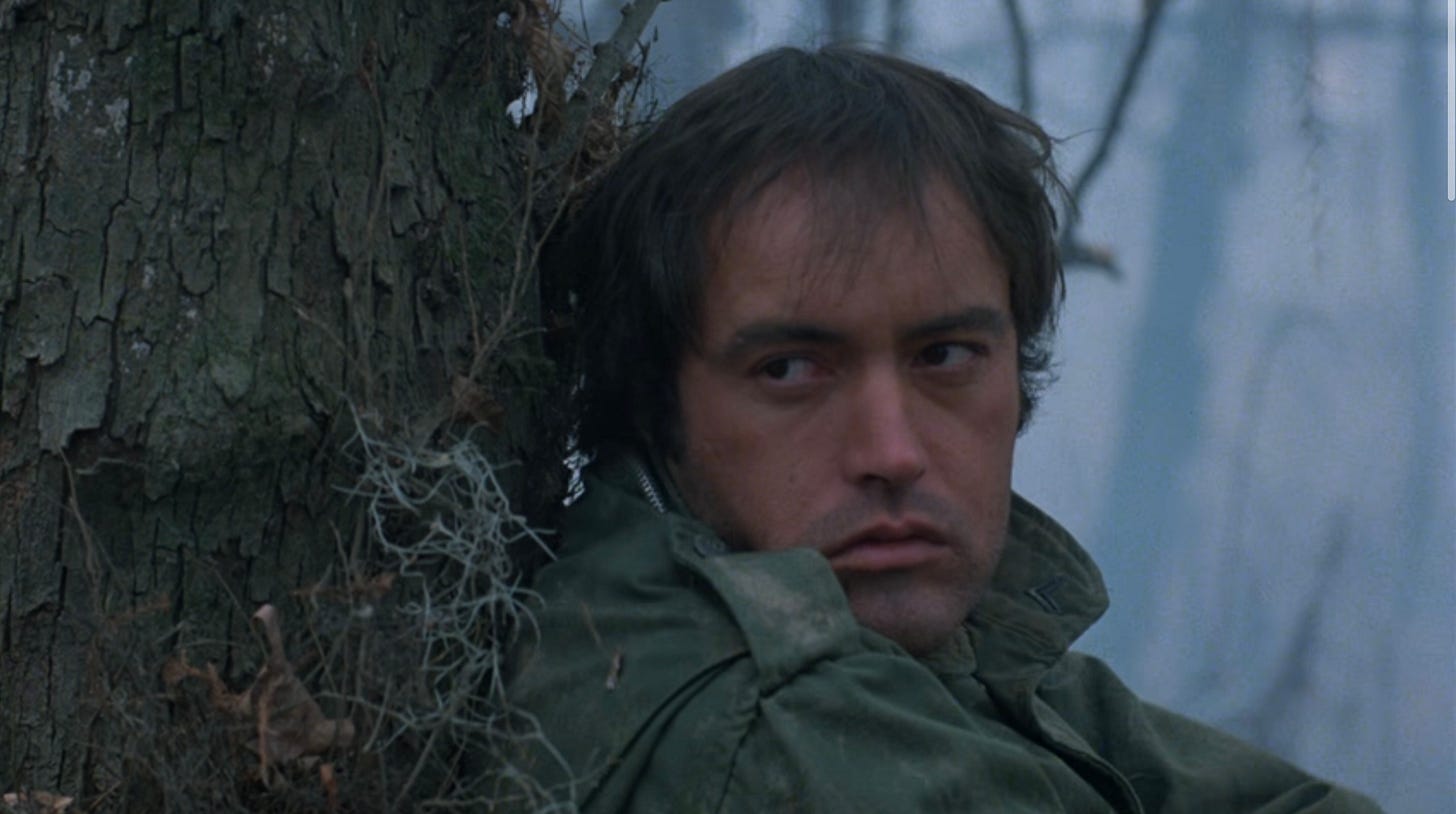
He finds a fellow level-headed soldier in Keith Carradine, and the two struggle to survive against the rough, unfamiliar terrain, even though it’s in their own backyard. The film takes pains to illustrate the divide between the soldiers drafted to Vietnam and the National Guard, who, as one character points out, were just beating up (and gunning down) American college students at that time. These are incompetent men who are given a gun and elevated to a position of importance, who claim dominion over a land that is — by every conceivable metric — not their own, as they are charged to defend the interests of the state and attack its “enemies”…on the home front.
Southern Comfort (1981) is streaming on Youtube, Amazon Prime, and Tubi (all free with ad breaks).
May December (2023)
Director: Todd Haynes
Nobody does breathy adult baby voice like Natalie Portman — but she finds a real formidable challenger in Julianne Moore in this terrific melodrama from director Todd Haynes, adapting a tight script by Samy Burch. The film is a loose fictionalization of the real-life Mary Kay Letourneau scandal, which fascinated the tabloid media in the late 1990s: the 34-year old Mary Kay was caught having an "affair" with her student, Vili Fualaau, then just 12 years old. Letourneanu went to prison and was forbidden from contacting Vili, but she did, and the "couple" maintained their "relationship" through Letourneau's sentencing and release; eventually the pair married and had several children. A fun fact courtesy of Vince: Mary Kay Letourneau’s brother, Joseph E. Schmitz, was one of Trump's foreign policy advisors.
In this film fictionalization, Julianne Moore is a former pet shop worker from a Savannah suburban community who previously began an “affair” with a young Korean boy (Riverdale hunk Charles Melton); the film examines their relationship years later, through the eyes of a Hollywood actress (Natalie Portman) who has come to observe the woman at the heart of this scandal in preparation for a film adaptation of her life story. The film sort of feels like if Ingmar Bergman’s Persona (1966) was rebooted in the 90s (a compliment), and it works on every level. Beautiful, ambiguous, darkly funny, and low-key audacious…no one delivers quietly seamless cinema like Haynes, who has worked with Moore several times, including on the equally intimate (and equally ambiguous) Safe (1995). The performances are the real standout, particularly from Melton, who plays someone forced into adulthood at such a young age that he never really gets to experience his own life: a broken, lost kid in a 36-year old body. Now that he has (graduating) high school kids of his own, he has to be an authority and sense of comfort to them despite having no model for either, tearing him apart from within. The young actor has already received acclaim for his performance from critics’ associations and seems poised to be an awards season frontrunner for Best Supporting Actor, which is entirely well-earned. Julianne Moore, meanwhile, plays her character like a woman also robbed of autonomy, but relishes in the infantilization, using it as a shield against self-introspection or developing a personal code of ethics. Natalie Portman, the undisputed queen of onscreen twisted girlishness, echoes back that self-absorption, becoming her subject so uncannily that it's completely unclear where she stops and ends... if she even exists at all! As white women, their crimes and moral failings are protected under the assumption of omnipresent innocence... even into old age. Melton’s character, as one of the few people of color in a small town, is not so lucky. And neither was Vili Fualaau, who finally separated from Letourneau in August 2019, less than a year before she died of cancer at age 58.
It’s a shame that this film went straight to Netflix; Mo, DJ, and I caught a 35mm screening at Lincoln Center during its brief (qualifying) engagement, and it just looked fantastic.
May December (2023) is streaming on Netflix.
The Honeymoon Killers (1970)
Director: Leonard Kastl

Few American films feel truly transgressive: the most infamous objets of American cinema are saturated with violence (and less often, sex)….Natural Born Killers (1994), Boondock Saints (1999), The Warriors (1979), etc… but those movies feel deliberately provocative more than transgressive. Well, here’s the exception that proves the rule: The Honeymoon Killers (1970), an independent cult crime film that is genuinely disturbing in its depiction of toxic misogyny and unfettered violence. The film tells a fictionalized version of the series of infamous real-life murders in the 1940s committed by Raymond Fernandez and Martha Beck, media sensations, dubbed the "lonely hearts killers.” Martin Scorsese was originally brought on to direct, only to be fired two weeks into production; it’s unclear to me what, if any, of what he shot remains in the film. It is director Leonard Kastle's only feature film.
Shot in startling black-and-white, this is a dirty, dark (though oftentimes Campy) film, and it’s outsider status only fuels that sense of transgression: this really feels like an anomaly of American cinema, unstuck in time, which can only be truly appreciated with time and distance (even though it found a particularly effusive contemporary fan in François Truffaut, who claimed it as his favorite American film). The film stars Sicilian-American actor Tony Lo Bianco (The French Connection (1971), The Seven-Ups (1973), Nixon (1995)…) and Shirley Stoler (Klute (1971), The Deer Hunter (1978), Seven Beauties (1975)…), respectively, as Raymond and Martha, two people brought together by a write-in pen pal service, which connects potential lovers through the mail. When the latter refuses to be pawned off by the former after they sleep together following months of written correspondence, he reveals something he has never told anyone: he’s a gigolo con artist, scamming elderly women out of money before sleeping with them on their “wedding night.” When Martha is not deterred by this revelation, she becomes his accomplice, accompanying him on his seductions as his “sister,” a nurse. But her jealousy at his flirtations and seeming inability to give up the game soon poisons the successful scheme they’ve perfected…. with deadly consequences. Tony Lo Bianco is great (and deeply sexy) as the gold digging miscreant, but Shirley Stoler, as Martha, embodies a leading lady I personally have not seen anywhere else in American film from this era: a big, beautiful woman. Sure, she’s a serial killer… and sure, she’s recalcitrant, moody, misogynistic, and deeply, deeply troubled… and a horrible human being… but in the pantheon of transgressive onscreen characters, she feels in a category all her own.
In twentieth century American film, fat women were constantly depicted as villainous, insecure shrews, whose weight stems as a result of an insatiable appetite that manifests in other areas of her life (usually in the realm of romance). It’s not that this film disrupts that archetype, exactly, but it does complicate it in fascinating ways. Yes, she’s a big, brash shrew… but she’s also capable of being loved. There is love here: a twisted, evil love, which can only ever exist on the margins of society and signify a complete violation of its standards, because of the social taboos that existed against finding fat women attractive. The “lovers on the run” subgenre of crime cinema (They Live by Night (1948), Bonnie and Clyde (1967), Badlands (1973), Natural Born Killers (1994), etc...) typically features a woman that can’t assimilate into mainstream society, either due to her own pathologies or the love she has for a dangerous man. Martha, with her face full of freckles and big, all-seeing eyes, is somewhere in between: undeniably beautiful — but desexualized because of her weight — and desperate for intimacy, even at the risk of her humanity. With its neorealist style and dispassionate, straightforward tone, the film leaves nowhere for the two murderers to hide, even as they slip further into their own personal fairytale. A(n) (unrecognizably!) young Doris Roberts, of Everybody Hates Raymond fame, plays Martha’s sort-of best friend Bunny, who gets her mired in this whole mess to begin with by singing her up for a letter exchange.
The Honeymoon Killers (1970) is streaming on [HBO] Max and The Criterion Channel.
Talk Radio (1988)
Director: Oliver Stone

Few films capture the slightly surreal experience of being a liberal in Dallas like this terrific drama led by genre king Eric Bogosian: a screen adaptation of the actor’s own 1987 Pulitzer Prize-nominated play (with an assist from director Oliver Stone). Set in the busy metropolis, the film tells the story of popular shock jock Barry Champlain (Bogosian), a Jewish FM radio personality who continually bumps heads with his call-in listeners, most of whom are conservative rednecks with opinions to match. They have bad takes and he’s insufferable in response: caustic and self-righteous, baiting callers and inciting contentious exchanges with the people he views as intellectual peons, which is pretty much everyone else. No one is spared a lambasting: everyone is insulted for listening in the first place. It’s a tense, aggressive dance, captured by Robert Richardson’s fluid camera, which transforms the static space of the radio station into an arena for gladiatorial combat. The play took inspiration from the real-life murder of Denver radio renegade Alan Berg in 1984, in which fringe white supremacists conspired to gun down the firebrand Jewish radio personality outside his home, a major striking blow from the burgeoning radical right. That very real sense of danger and imminent doom translates to this stressful huff of a film: one evening, just as Barry learns that he’s going to be nationally syndicated, he receives some threatening fan mail on his desk, alongside a caller who boasts of sending it. The calls are increasingly hostile and threatening, particularly from those on the far-right: he may live in one of the largest cities in the country, but this is still Texas. To quote Blood Simple (1984): “In Russia, they got it mapped out so that everyone pulls for everyone else... that's the theory, anyway. But what I know about is Texas, and down here... you're on your own.”
Barry’s firebrand remarks catapult him towards almost certain death, as he reflects on his own life and increased isolation (particularly from his producer/girlfriend, Leslie Hope, and his ex-producer/wife, Queen Icon Ellen Greene). Acclaimed on release, the film won the Silver Bear at the Berlin International Film Festival and — mostly — holds up, though there are a few lines that are so Boomer Brained it is a bit hard not to laugh (such as when an older man tells his younger girlfriend "You don't know Vietnam" as a reason they should split). Shot on location in Dallas and Irving, the film makes particularly memorable use of the Dallas skyline at night, and I have to say, for an adaptation of a play set in Cleveland, this film pretty effectively nails what it's like to live in a neon-lit concrete jungle populated by “small-town” values (bizarre). The film's use of "Bad to the Bone" mirrors DFW-area radio station 93.9 "The Bone,” which sadly rebranded many years ago.
Talk Radio (1988) is available to rent on digital platforms.
The Quick and the Dead (1995)
Director: Sam Raimi

Sharon Stone stars as a sexy, taciturn sharpshooter in this deeply fun, low stakes anti-Western from genre maestro Sam Raimi, which I watched as part of Criterion Channel’s “Women of the West” program, a terrific line-up of women-led Western films — if you’ve never seen Joan Crawford star as a sexy, taciturn sharpshooter in Nicolas Ray’s Johnny Guitar (1954), you’re missing out one of life’s greatest pleasures. The film tells the story of a shooting contest in the fictional Old West town of Redemption, and the cast of dubious characters who assemble to fight quickdraw man-on-man shootouts. I can’t tell you the utter sense of calm that settled upon me at the realization that the film did not hold higher ambitions than showcasing a bunch of Guys Shooting at Each Other, a conceit that would potentially be dreadfully dull in lesser hands, but is rendered absolutely dynamic through Raimi’s comic book visual sensibility. And what a bunch of guys! The film stars a bevy of terrific character actors doing their own, flamboyant things: Keith David, Batman: the Animated Series’ Kevin Conway, Lance Henriksen, Saw’s Tobin Bell (!), Gary Sinise, Woody Strode…even Raimi bestie Bruce Campbell, all of whom provide the colorful tapestry of characters captured by Raimi’s quickdraw, freewheeling lens, courtesy of the legendary Dante Spinotti, and the rapid-fire editing that injects tension straight into the (relatively static) match-ups between shooters.
It’s a fun, gorgeously wrought endeavor, bolstered by central performances from some of the greatest actors of the era: Stone, obviously, but also Gene Hackman, playing the corrupt town daimyo at the center of her plot for revenge, and Russell Crowe, long-haired and (frankly) ruggedly beautiful here, as a sharpshooting former gang member turned pastor, forced into competition. But every truly great 90s film needs its showy central jewel, and this film finds it in a young Leonardo DiCaprio (then just 21!), as “The Kid,” the handsome, cocksure son of Gene Hackman with his own revenge agenda. DiCaprio — fresh off his buzzy performance in What’s Eating Gilbert Grape (1993) but still just shy of his leading man breakout performance in Baz Luhrmann’s Romeo + Juliet (1996) — was apparently considered such a risky hire for the role that the studio outright refused him. Recently, it was revealed that Sharon Stone — eager to work with the young actor — actually paid his salary for the film, ensuring his hire. It’s a gamble that pays off handsomely: you can’t take your eyes off the brash, talented performer, who has a terrific, borderline taboo sexual chemistry with his older leading lady.
The film’s title is a play on the famous phrase from the (King James) Bible, which refers to all those that God has dominion over (both the “quick,” or alive, and the dead). We’re just going to ignore that Joss Whedon allegedly did punch-up on this film.
The Quick and the Dead (1995) is streaming on the Criterion Channel.





